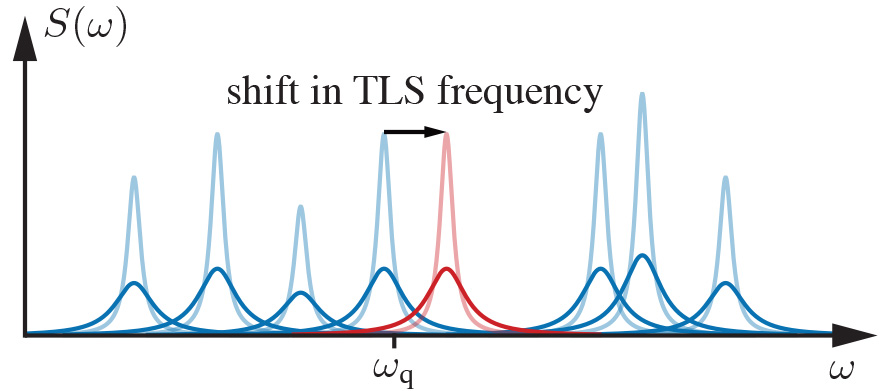Stabilizing and Improving Qubit Coherence by Engineering Noise Spectrum of Two-Level Systems
Novel protocols reduce qubit noise and stabilize coherence times by engineering the noise spectrum of two-level systems, offering a complementary approach to improving quantum computing performance.
The Science:
Superconducting circuits are a leading platform for quantum computing. However, their coherence times are still limited and exhibit temporal fluctuations. Those phenomena are often attributed to the coupling between qubits and material defects that can be well described as an ensemble of two-level systems (TLSs). Among them, charge fluctuators inside amorphous oxide layers contribute to both low-frequency $1/f$ charge noise and high-frequency dielectric loss, causing fast qubit dephasing and relaxation. Moreover, spectral diffusion from mutual TLS interactions varies the noise amplitude over time, fluctuating the qubit lifetime.

In the presence of a random shift in a TLS frequency, the spectral density probed by the qubit at $\omega_\text{q}$ fluctuates less for flattened peaks, corresponding to larger TLS line-width.

Schematic representation of a transmon qubit with applied strain field.
(a) An IDT is fabricated on a local piezoelectric thin-film, which generates SAW propagating towards the transmon qubit.
(b) A piezo actuator is placed underneath the qubit chip to induce the deformation. Adapted from Grabovskij et al (2012).
(c) Geometry of a transmon qubit. Green areas denote the metal pads with characteristic distance d. The yellow cross symbolize the Josephson junction with width I, and the gray background represents the substrate.
The Impact:
Here, we propose to mitigate those harmful effects by engineering the relevant TLS noise spectral densities. Specifically, our protocols smooth the high-frequency noise spectrum and suppress the low-frequency noise amplitude via depolarizing and dephasing the TLSs, respectively. As a result, we predict a drastic stabilization in qubit lifetime and an increase in qubit pure dephasing time. Our detailed analysis of feasible experimental implementations shows that the improvement is not compromised by spurious coupling from the applied noise to the qubit.
Summary:
We developed protocols to stabilize and improve qubit coherence times by engineering the relevant noise spectral densities of an ensemble of TLSs. Specifically, our calculations showed that the high-frequency noise spectrum gets flattened in the presence of applied longitudinal noise on TLSs, leading to an order of magnitude stabilization of qubit lifetime. Moreover, we demonstrated that the low-frequency noise amplitude is significantly suppressed via the implementation of transverse noise on TLSs, which results in a longer qubit pure dephasing time. Finally, we discussed feasible experimental realizations and confirmed that the spurious coupling from the applied noise does not limit the qubit performance. Our results thus suggest a complementary approach to improve qubit coherence, in addition to better qubit design and material investigation.
Contact:
Xinyuan You – xinyuan@fnal.gov
Focus Area:
Materials for 2D and 3D Quantum Devices
Institutions:
Fermi National Accelerator Laboratory
Citation:
X. You, Z. Huang, U. Alyanak, A. Romanenko, A. Grassellino, and S. Zhu, Stabilizing and Improving Qubit Coherence by Engineering the Noise Spectrum of Two-Level Systems, Physical Review Applied 18, 044026 (2022).
https://doi.org/10.1103/PhysRevApplied.18.044026
Funding Acknowledgement:
This material is based upon work supported by the U.S. Department of Energy, Office of Science, National Quantum Information Science Research Centers, Superconducting Quantum Materials and Systems Center (SQMS) under contract number DE-AC02-07CH11359.
